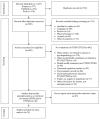What Is the Impact of Unemployment as an Adverse Experience? Post-Traumatic Stress Disorder and Complex Post-Traumatic Stress Disorder: A Meta-Analysis
- PMID: 40427813
- PMCID: PMC12110764
- DOI: 10.3390/ijerph22050696
What Is the Impact of Unemployment as an Adverse Experience? Post-Traumatic Stress Disorder and Complex Post-Traumatic Stress Disorder: A Meta-Analysis
Abstract
This meta-analysis examined how unemployment, a psychosocial stressor, influences post-traumatic stress disorder (PTSD) and complex PTSD (CPTSD). It specifically explores unemployment as a risk factor for trauma, with emphasis on CPTSD, and investigates economic variables, including the GINI coefficient, as potential moderators. A systematic search in Web of Science, Scopus, and PubMed yielded 33 studies comprising more than 57,000 participants. Odds ratios (OR) were computed, and a random-effects model was used to synthesize the findings. Meta-regression analyses were conducted to evaluate the effects of economic inequality (GINI) and nominal gross domestic product (NGDP), but neither moderator reached statistical significance; this is addressed in detail in the Discussion. The results revealed that unemployment significantly elevated the risk for PTSD (OR = 1.500; logOR = 0.3826; PI: 0.457-4.702) and CPTSD (OR = 2.180; logOR = 0.7430; PI: 0.501-8.808), with a stronger impact on CPTSD. These findings emphasize unemployment as a pivotal predictor of trauma, especially CPTSD, broadening the traditional focus on interpersonal factors. They also highlight the importance of integrating psychosocial and economic variables into clinical assessments and public health policies. Addressing both unemployment and economic inequality could be critical for effective interventions and prevention efforts, underscoring the need for further multidisciplinary research.
Keywords: CPTSD; PTSD; meta-analysis; risk factors; unemployment.
Conflict of interest statement
The authors declare no conflict of interest.
Figures
References
-
- Arena A.F., Mobbs S., Sanatkar S., Williams D., Collins D., Harris M., Harvey S.B., Deady M. Mental health and unemployment: A systematic review and meta-analysis of interventions to improve depression and anxiety outcomes. J. Affect. Disord. 2023;335:450–472. doi: 10.1016/j.jad.2023.05.027. - DOI - PubMed
-
- Paul K.I., Batinic B. The need for work: Jahoda’s latent functions of employment in a representative sample of the German population. J. Organ. Behav. 2010;31:45–64. doi: 10.1002/job.622. - DOI
Publication types
MeSH terms
LinkOut - more resources
Full Text Sources
Medical
Research Materials
Miscellaneous




